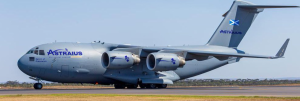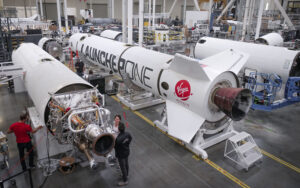DOVER Satellite Brings Many UK Firsts
12th Aug 2022
The UK’s first satellites launched from home soil will finally take to the skies this year. Virgin Orbit confirmed that the DOVER Satellite completes the line-up for its first mission outside the US. The announcement coincided with the opening of the Farnborough Airshow earlier in July.
The DOVER satellite focuses on research in location and navigation. It was built in the UK (in Oxfordshire to be precise). Space company Open Cosmos developed the satellite which was made by the Rhea Group firm of engineers. A sign of the promising times for the UK’s space ambitions.
The UK launch makes an exciting statement for the UK’s ambitions to become a key player in global space technology. The launch features a number of different satellites. The UK’s Space Forge and Horizon Technologies each built one satellite. Prometheus-2 research demonstration satellite developed by Airbus Defence and Space will fly as well. Prometheus-2 is the result of a collaboration between a number of international defence partners. These include the UK’s Defence Science and Technology Laboratory.
About Spaceport Cornwall
Cornwall’s rural, Western location is the perfect spot for a horizontal launch UK spaceport. Its location places it as close as possible to possible launch zones. The site will finally make the leap into “fully-functioning” in 2022.
The spaceport will work in conjunction with the Cornwall Airport in Newquay and Goonhilly Earth Station. Virgin Orbit’s work with Cornwall Council shows that the industry sees the case for making use of the facilities.
Technically, the public owns Cornwall Airport thanks to Cornwall Council. There are opportunities for UK-based companies to seek help through the Enterprise Zone for financial support for space projects. BT owns the facilities at Goonhilly. The site is described as “a recognised centre of excellence in Communications Engineering,Teleport Services, R&D, Manufacturing, Training, Outreach and Education.”
Spaceport Cornwall boasts one of the longest runways in the UK at nearly 3,000 metres, access to the sea, and relatively low numbers of residential properties (and therefore fewer considerations for operation). The Aircraft Shelters on site allow for propulsion tests, and the close relationship with Goonhilly means effective tracking and mission control.
The DOVER Satellite
The UK Space Agency co-funded and assisted RHEA Group in realising the DOVER satellite. In particular, the project agency’s ongoing investment in the ESA’s Navigation Innovation and Support Programme.
DOVER could see potentially fascinating results. It will transmit a signal engineered by RHEA for obtaining data for use here on Earth in order to work out accurate timing and positioning. The company describes these as “Positioning, Navigation and Timing (PNT)” techniques.
This is actually RHEA Group’s first satellite, so this launch will see many new approaches and uncharted territory. This is what the UK Space industry should represent. However, the mission is far from simply “testing the water”. The UK’s expert reputation in PNT and support on the project from Open Cosmos make this one of the most exciting satellite launches scheduled.
Emma Jones, RHEA’s UK Business Director, spoke about the company’s excitement and ambition in launching DOVER.
This is a momentous event for RHEA. This year we are celebrating our 30th anniversary and it is a great milestone to launch our first ever satellite in the same year. The UK is in the very desirable position of establishing a number of spaceports, and it is thrilling to have a RHEA satellite on board the first launch to take off from UK soil.”
DOVER is named after the Dover Strait, the narrowest part of the English Channel. This is a key area for running tests of these new PNT techniques. Open Cosmos and the new UK facilities enabled the project’s immense speed, which took eight months from the first concept through to an operational satellite. Florian Deconinck from Open Cosmos also praised The UK Space Agency and ESA-NAVISP teams for assisting the speed of the process.
What The Launch Will Look Like
For many from the UK, it can be hard to envisage exactly what a space launch or satellite launch looks like. With a horizontal launch, it will not look quite like the movies.
The launch mission will see a Virgin Orbit 747 craft take off on the runway, similarly to any other plane. It will fly over the sea, before it blasts the rocket forward into space, which will be how the satellites onboard reach orbit.
The launch will be led by Matthew Stannard, an RAF Test Pilot who is on placement working with Virgin Orbit.
The mission will mirror the ‘Straight Up’ mission in Mojave earlier in July, using the fully mobile LauncherOne system to deliver payloads into space from Virgin Orbit craft.
Virgin Orbit’s CEO Dan Hart spoke of the UK launch:
We’re very pleased to have been selected by RHEA Group and Open Cosmos for their first joint mission. The DOVER satellite, designed and built in the UK by Open Cosmos, co-funded by the European Space Agency, and now will be launched from Cornwall, is a great example of the power that comes with the infusion of space collaboration taking place across the globe.
The work RHEA will do with their DOVER satellite will help to assure reliable navigation, which touches all of us and can be vital for everything from environmentally efficient shipping to national security.
A Pioneering Launch
Besides DOVER, Virgin Orbit already announced some exciting satellites confirmed for the launch. including Prometheus-2, which is a project involving the MOD as well as the American National Reconnaissance Office (NRO). It will send two small ‘Cubesats’ which allow testing with radio signals and GPS, as well as sophisticated imaging. This will allow a more connected and flexible communication system and efficient operations and satellites and data processing.
The Virgin Orbit flight will also launch Amber-1. This is the first of over 20 potential Amber satellites to be sent into space to provide Maritime Domain Awareness. This clever satellite will use radio data from shops all over the world, to gather intelligence and provide information regarding potential piracy, trafficking, terrorism, and other illegal activities such as fishing and smuggling.
The UK’s contribution to design, manufacturing, and application of satellites is nothing new, but the fact that it will now gain the ability to launch from home cements the United Kingdom as a key player in global space efforts.






Thank you for your comment! It will be visible on the site after moderation.